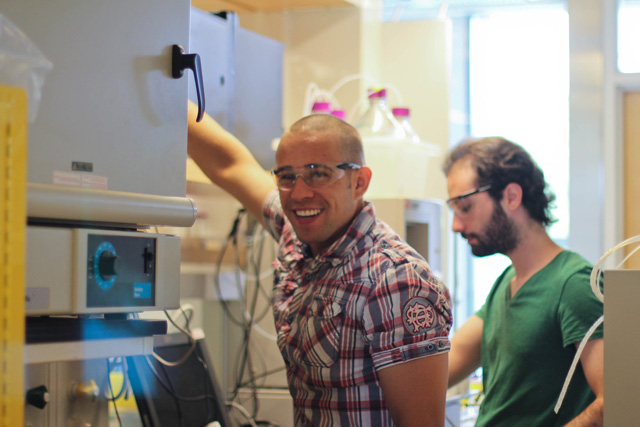
Students at all levels are encouraged to undertake original research under the supervision of a member of the chemistry faculty through the Undergraduate Research Opportunities Program (UROP). It is the goal of the undergraduate chemistry program to encourage students to become active members within the departmental academic community. Interaction between undergraduates, faculty, and graduate students is strongly promoted through class and laboratory contact, advising, and through more informal functions.
Undergraduate Research Opportunities Program (UROP)
The UROP advisor for the Chemistry Department is Prof. Alex Radosevich (Room 2-321, x3-4503). If you are interested in a chemistry UROP you should make an appointment with him to discuss your research interests and to receive advice on how to find a position in the department.
Please note that credit is obtained for undergraduate research by registering for 5.UR or 5.URG and by submitting a for-credit UROP application before the UROP deadlines. To receive credit, students enrolled in 5.UR (research for Pass/Fail grade) must file a progress report with the UROP coordinator. To receive credit, students enrolled in 5.URG (research for letter grade) are required to submit a ten-page final written report to their research advisor prior to the last day of classes. Please note that 5.URG may be taken for up to 12 units per term, not to exceed a cumulative total of 48 units.
For more detailed information about UROP, please visit the UROP Office website.
UROP Symposium
Please join us for the Spring 2023 UROP Symposium on Friday, May 12, from 1:00-5:00 PM. The schedule is as follows:
Oral Presentation, 1-4pm in 2-136
Poster Session, 4-5pm in lobby of Building 18. Refreshments will be served.
The list of the 2023 Oral Presentations and Poster Presenters will be updated soon.
Oral Presentations Session #1 (TBD)
Poster Presentations (TBD)
Oral Presentations Session #2 (TBD)
5.39 Research and Communication in Chemistry
To enroll in 5.39 for the Spring 2023 term:
- Write a summary paragraph about your research, using the format in this example from Nature.
- Ask your UROP advisor to email Angelina Toro to confirm that they approve of your enrollment in 5.39. If your advisor has already emailed Professor Radosevich to approve enrollment in 5.39 there is no need to have them email Michelle as well.
- As a reminder, the research must be conducted on the MIT campus and be a continuation of a previous fulltime UROP project from an academic or summer term in 2021. The research must under the direction of a member of the Chemistry Department faculty
- The approval from your advisor and summary paragraph should be submitted by 9:00am on Wednesday, January 19th. You will be notified about permission to enroll in 5.39 no later than the end of the day on Tuesday, January 24th.
Undergraduate Thesis
Students preparing a thesis should enroll in course 5.THU in the semester they intend to submit their thesis (generally the spring of senior year). At least two semesters of research (summer UROP is considered to be the equivalent of a semester of research) in addition to the “5.THU semester” usually constitutes the minimum research experience that can provide the basis for a satisfactory thesis. Research toward a thesis carried out prior to 5.THU can be conducted for credit under 5.UR, 5.URG, or as “UROP for Pay.” Students enrolled in 5.THU may not simultaneously enroll in 5.UR or 5.URG in the same semester and may not receive financial support that semester through the UROP program, although they may be directly employed by faculty members as research assistants.
STYLE AND LENGTH
The student’s advisor will provide guidance concerning the specific style and organization appropriate for the thesis. In general, the style should be appropriate for a full journal article in the student’s particular area of chemistry. In most cases the thesis will include sections entitled “Introduction and Background,” “Results and Discussion,” and an Experimental Section. Literature citations should follow the format required by typical journals in the specific area of research.
The thesis should be double-spaced and typically will be 25 to 50 pages in length—under no circumstances should the length exceed 100 pages. The thesis should begin with a Title Page followed by a one-page Abstract, both conforming to the format described in the publication “Specifications for Thesis Preparation” prepared by the MIT Libraries Archives Department (14N-118). A Table of Contents should also be included in the thesis.
SUBMISSION OF THE THESIS
Students completing a thesis in Fall term must submit their thesis no later than Friday, January 20, 2023. Students completing a thesis in the Spring term must submit their thesis no later than Friday, May 12, 2023. Please submit a copy of your thesis as a PDF/A-1 to Jennifer Weisman this deadline, following the MIT Thesis Specifications available here. Please also submit a signed title page with digital signatures from you, your UROP advisor, and Professor Elizabeth Nolan (Associate Department Head). Please see here for a full guide (with screenshots) to using DocuSign to obtain digital signatures; please disregard the references to a graduate thesis. If you would like to have a personal, bound copy of your thesis please let Jennifer know and the department will arrange this.
EVALUATION OF THE THESIS AND UNDERGRADUATE RESEARCH SYMPOSIUM
The student’s Research Supervisor will read the thesis and determine the letter grade the student will receive for course 5.THU. In general, students should enroll in 5.THU for 6 to 21 units. An Undergraduate Research Symposium is held each spring and all students completing theses are encouraged to make an oral presentation at the symposium. Information about the Undergraduate Research Symposium will be posted on the Department of Chemistry website by Professor Alex Radosevich, the Symposium Coordinator.
